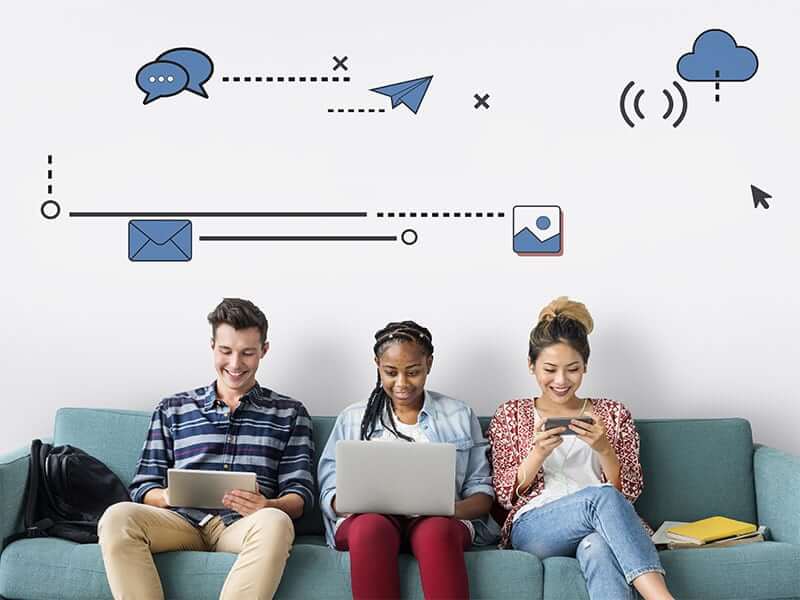It’s a common concern of every parent in this modern world of gadgets and the internet. Just what impact is exposure to the online world and social media having on our kids and how can we protect them from potential dangers?
We spoke with Dr Quratulain Zaidi of MindNLife about the impact on mental health that engagement with social media might be having – especially for teenagers, and what we can do to help.
Challenges of adolescence
It’s hard for kids to go through adolescence these days, because they have to go through it twice: once in the real world, and once in the online world. It’s no wonder preliminary research findings are showing that social media and text messages – things that have become so integral to teenage life – are detrimental to their mental health, and are promoting anxiety and lowering self-esteem. A recent survey carried out among 14-to-24-year-olds in the UK by the Royal Society for Public Health asked them how various social media platforms impacted their health and wellbeing. The results showed that Snapchat, Facebook, Twitter and Instagram all led to increased feelings of depression, anxiety, poor body image and loneliness.
Self-esteem comes from consolidating who you are; and, as I’ve mentioned, teens have both an online and a real-life identity to consolidate in this era of social media platforms. This works as a breeding ground for promoting low self-esteem in a vulnerable population. The more identities you have, and the more time you spend pretending to be someone you aren’t, the bigger the impact on your own self-esteem.

Online behaviour
Teens tend to spend hours going through their photos, looking for that perfect image to post on Instagram and finding the right caption to generate the most likes. The perfect Instagram stories that they see from their peers create further pressure and dissatisfaction with their own lives. And they don’t realise that the perfect photo may come at the cost of days of suffering.
The race to be popular can also lead to them sharing inappropriate images of themselves or their friends, and this can have a long-term detrimental impact on some. The most worrying trend I hear about in my office currently is where girls are posting nude images to be more popular. It’s almost like they’re being taught by social media that taking your clothes off gets you more likes and followers; therefore, this trend of using sexuality to be popular is being normalised. It has taken society centuries to get to a place where objectifying female gender is not acceptable, and I’m worried about the impact of this trend on a whole generation.
Another thing I often hear from teens is, “I use social media to connect with friends and groups who understand me better and are helpful.” The downside of being constantly connected with “friends” online is that these teens often end up suffering one or many of the following:
- cyberbullying;
- toxic and unhelpful connections with groups and people;
- sleep deprivation (I haven’t come across a single teen in recent months who hasn’t complained about lack of sleep!);
- constant engagement in conversations, which is unhealthy and can be draining;
- decreased eye to eye contact and decreased real-life human interaction; this is creating a generation who will end up missing out on learning the nuanced social skills you only learn by engaging with people in real life.
Negative effects
Why is social media so destructive for everyone, and especially young people? Preliminary research and studies are showing increased anxiety and depression, and social media platforms have become an outlet for instant emotional displacement. People feel justified to instantly offload their feelings, emotions and thoughts without thinking about the impact. This is becoming the norm in our society: it’s “Generation ‘Like’”! The need to get more and more likes can create pressure on teens to do and post things that a lot of them wouldn’t do in real life. This pressure to maintain a certain online identity can be draining and, in turn, have a negative impact on mental health.
As for cyberbullying, it’s much easier to bully someone from behind the screen. Why? Because you feel you aren’t dealing with the real person. You are depersonalising them, and you would probably never say those things to them in real life. This can lead to serious consequences for some who are on the receiving end, where they feel life isn’t worth living. It’s not uncommon for teens so it is: suicidal as a result.
Then there is the sense of not being good enough – failing to keep up with the popular mob, feeling left out because life doesn’t seem as perfect on your own Instagram or other social media platform as it does on those of others, who are popular and happy and look great. Everything from physical appearance to social lives is perceived as a measure of success – therefore, in comparison, you are a failure. Surely this constant reminder that life isn’t great every moment doesn’t make anyone feel good about themselves.
The reality is, people often forget that a social media post is just a photograph – one moment that may have taken hours to perfect and which is then posted online to create a false image of a perfectly happy and popular life. Trust me, I’ve met many adults and teens who have spent hours creating these perfect Instagram moments, and yet the truth behind those moments is far from perfect.
I always say there is no delete button on social media; it’s an “archive” button. The lack of privacy, where every moment of life is shared publicly, eventually takes its toll on the mental health of teens. Making them aware of this is imperative.
How you can help
In summary, while there is no study to show that teens and others are missing out if they’re not connected to social media, I strongly feel they will miss out on life if they don’t stay connected with real-life humans. They need to learn to value and respect themselves, and preserve these values and self-respect; these things can’t be taught through a social media platform.
So, it’s important to encourage them to balance their use of social media, and to keep an eye out for signs that it may be impacting them negatively. Lead by example and maybe evaluate your own relationship with social media. Disconnect on weekends and show your teen that there’s a whole world out there that doesn’t require a handheld screen. They will miss the phone a lot less than what they imagine.
Finally, a suggestion for this festive season: let the whole family try a social-media-free holiday. Is it even possible?
Dr Zaidi is a British-registered clinical psychologist who works in private practice in Central, and as a mental health consultant for a number of international schools.
6347 9955 | mindnlife.com
See more in our Health & Fitness section
Practice to holistic approach to your health
Let’s talk about screen addiction
This article first appeared in the December/January 2018/19 issue of Expat Living magazine. Subscribe now so you never miss an issue.





